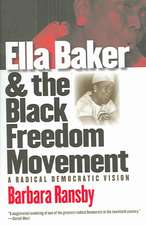Black Germany: The Making and Unmaking of a Diaspora Community, 1884–1960
Autor Robbie Aitken, Eve Rosenhaften Limba Engleză Paperback – 25 noi 2015
| Toate formatele și edițiile | Preț | Express |
|---|---|---|
| Paperback (1) | 321.74 lei 6-8 săpt. | |
| Cambridge University Press – 25 noi 2015 | 321.74 lei 6-8 săpt. | |
| Hardback (1) | 757.52 lei 6-8 săpt. | |
| Cambridge University Press – 25 sep 2013 | 757.52 lei 6-8 săpt. |
Preț: 321.74 lei
Nou
Puncte Express: 483
Preț estimativ în valută:
61.57€ • 66.86$ • 51.72£
61.57€ • 66.86$ • 51.72£
Carte tipărită la comandă
Livrare economică 22 aprilie-06 mai
Preluare comenzi: 021 569.72.76
Specificații
ISBN-13: 9781107595392
ISBN-10: 1107595398
Pagini: 384
Ilustrații: 18 b/w illus.
Dimensiuni: 230 x 153 x 20 mm
Greutate: 0.51 kg
Editura: Cambridge University Press
Colecția Cambridge University Press
Locul publicării:New York, United States
ISBN-10: 1107595398
Pagini: 384
Ilustrații: 18 b/w illus.
Dimensiuni: 230 x 153 x 20 mm
Greutate: 0.51 kg
Editura: Cambridge University Press
Colecția Cambridge University Press
Locul publicării:New York, United States
Cuprins
Introduction; 1. The first generation: from presence to community; 2. Should I stay and can I go? Status and mobility in the institutional net; 3. Settling down: marriage and family; 4. Surviving in Germany: work, welfare and community; 5. Problem men and exemplary women? Gender, class and 'race'; 6. Practising diaspora - politics 1918–33; 7. Under the shadow of national socialism; 8. Refuge France?; Epilogue.
Recenzii
'This is a very impressive book that provides fascinating information about the everyday lives of Africans in Germany and sheds new light on a hitherto unknown episode of twentieth-century history. It also makes a more general argument about race, community and Diaspora, based on painstaking archival research.' Andreas Eckert, Humboldt-Universität zu Berlin
'With painstaking and imaginative research, Robbie Aitken and Eve Rosenhaft have reconstructed the lives of individual Africans across multiple colonial regimes, from the German Empire to the French League of Nations mandate, and multiple German regimes, from the Kaiserreich to the Third Reich. Black Germany makes an important and persuasive argument about the emergence of a black German community and identity from the intersection of specific African and German histories. It shows that becoming black - that is, self-consciously part of an international community defined by 'race' - intersects with more particular and local historical entanglements. This is an important work of transnational history.' Andrew Zimmerman, George Washington University
'This is a thoroughly researched book. In their efforts to trace the biographies of their subjects, the authors consulted an impressive number of archives and provide an enormous amount of detail. Their judgment is measured and careful. It is true that the Cameroonians in Germany were numerically a small group, but their history illustrates crucial aspects of the history of black people in Germany and helps to open up a different perspective on German history. Their connections with wider issues of blackness in the diaspora also offer a fascinating transnational axis of analysis.' Raffael Scheck, German History Journal
'… a marvelously written account of Africans in pre-WWII Germany that spotlights the potential benefits of co-authorship and years of painstaking research … the book nuances our understanding of the importance of race and colonialism in twentieth-century Germany. Scholars and students interested in these topics will greatly benefit from reading it.' Michael Goebel, H-Soz-u-Kult
'… a richly detailed history of German nation-building, colonialism, and black diasporic migration that deserves close attention … Black Germany should and hopefully will be picked up by readers interested in exploring new histories of nationalism, colonialism, and racism. What Aitken and Rosenhaft have exposed to us is not a forgotten history but a history of forgetting. It is a history of erasing black bodies and experiences from white German memory, so much so that we continually express surprise when we encounter black people in Germany's history or present day. Yet Black Germany reminds us that we must always interrogate our understandings of the past.' Kira Thurman, H-Net
'With painstaking and imaginative research, Robbie Aitken and Eve Rosenhaft have reconstructed the lives of individual Africans across multiple colonial regimes, from the German Empire to the French League of Nations mandate, and multiple German regimes, from the Kaiserreich to the Third Reich. Black Germany makes an important and persuasive argument about the emergence of a black German community and identity from the intersection of specific African and German histories. It shows that becoming black - that is, self-consciously part of an international community defined by 'race' - intersects with more particular and local historical entanglements. This is an important work of transnational history.' Andrew Zimmerman, George Washington University
'This is a thoroughly researched book. In their efforts to trace the biographies of their subjects, the authors consulted an impressive number of archives and provide an enormous amount of detail. Their judgment is measured and careful. It is true that the Cameroonians in Germany were numerically a small group, but their history illustrates crucial aspects of the history of black people in Germany and helps to open up a different perspective on German history. Their connections with wider issues of blackness in the diaspora also offer a fascinating transnational axis of analysis.' Raffael Scheck, German History Journal
'… a marvelously written account of Africans in pre-WWII Germany that spotlights the potential benefits of co-authorship and years of painstaking research … the book nuances our understanding of the importance of race and colonialism in twentieth-century Germany. Scholars and students interested in these topics will greatly benefit from reading it.' Michael Goebel, H-Soz-u-Kult
'… a richly detailed history of German nation-building, colonialism, and black diasporic migration that deserves close attention … Black Germany should and hopefully will be picked up by readers interested in exploring new histories of nationalism, colonialism, and racism. What Aitken and Rosenhaft have exposed to us is not a forgotten history but a history of forgetting. It is a history of erasing black bodies and experiences from white German memory, so much so that we continually express surprise when we encounter black people in Germany's history or present day. Yet Black Germany reminds us that we must always interrogate our understandings of the past.' Kira Thurman, H-Net
Notă biografică
Descriere
A groundbreaking account of the development of Germany's first African community, which offers fascinating perspectives on transnational German history.














